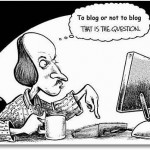 One of the recent challenges for Civil Procedure profs has been to explain the Twombly/Iqbal event to students already struggling to understand what often seems to be an arcane and highly contrived subject.
One of the recent challenges for Civil Procedure profs has been to explain the Twombly/Iqbal event to students already struggling to understand what often seems to be an arcane and highly contrived subject.
I begin by lowering expectations, showing a slide of a local federal judge with a caption depicting his reaction to Twombly – expressed on a panel discussing the case at a CLE seminar. “When I read this case,” he recalled, “I said ‘what the hell?'” I remember following the good judge’s remarks and saying that he had succinctly summarized Twombly and all that would follow would be mere elaboration. After Iqbal, I am afraid I still can’t do much better.
Except maybe I can.
It seems to me that the Court’s new plausibility standard has something to do with the likelihood that the plaintiff could have facts supporting the allegations being made, the ability of a factfinder to accurately infer those facts from circumstantial evidence and the difficulty in confirming whether or not the plaintiff will ultimately be able to make a prima facie case. I was a litigator for 25 years before becoming a full time legal academic (and still keep my hand in). I think that I have a good sense for when the plausibility meter is stuck in the zone in which, in the words of a local magistrate judge, a complaint must be “Iqballed.” But if its hard to translate that sense into a set of principles that courts can readily discern and apply, imagine how hard it must be to explain it to ILs.
The obvious irony, of course, is that the Iqbal majority – a group that, with the exception of Justice Kennedy – often calls for doctrine that has the value of clarity and predictability have endorsed a pleading standard that is anything but the sort. Like Justice Stewart and pornography, I think a know a deficient complaint when I see it. But it’s hard to say why.
Cross posted at PrawfsBlawg

The Supreme Court has been blessed (or cursed)with members in recent decades who like to accumulate and monopolize legal authority in their own hands. This is a tendency that cuts across the ideological spectrum of Justices. Typically, Congress is the victim of the Court’s siphoning of power. With the Twombley and Iqbal decisions,it is juries who lose power.
In both circumstances, the Court is acting in a counter-majoritarian fashion, taking away authority from law making sources that reflect democratic impulses. Increasingly, it seems, the people don’t make law. Instead, the people are told what the law is. My fear is that both political parties have come to view the Supreme Court as a prize to be won, with nominations put forth that reflect this view, and that this trend towards a centralization of power in the Court cannot be reversed.